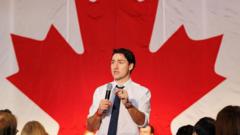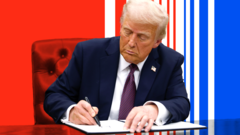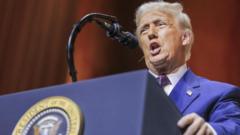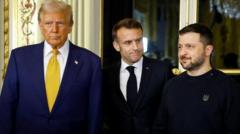Canadian Prime Minister Justin Trudeau has voiced concerns to business leaders regarding President Donald Trump's potential plans to absorb Canada, citing the latter's comments about making Canada the "51st state." Trudeau's remarks at a Canada-US Economic Summit in Toronto highlight a significant shift in the perception of Trump's threats, as they come on the heels of his tariffs aimed at Canadian exports. This situation poses economic risks for Canada, provoking widespread concern among its citizens.
Trump's Threat to Annex Canada: Trudeau Raises Alarm

Trump's Threat to Annex Canada: Trudeau Raises Alarm
Prime Minister Trudeau warns about Trump's serious intentions to annex Canada during an economic summit.
In a closed session at the Canada-US Economic Summit held in Toronto, Prime Minister Justin Trudeau expressed his apprehensions about President Donald Trump's intentions to annex Canada. Trudeau articulated that Trump has allegedly floated the idea of making Canada the "51st state" primarily to gain access to its vital mineral resources. "Mr. Trump has it in mind that the easiest way to do it is absorbing our country, and it is a real thing," Trudeau noted, according to reports from Canadian media outlets, after his comments were inadvertently captured by a microphone.
The prime minister's remarks come in the context of Trump's recent threats to impose hefty tariffs on Canadian exports—25% on most goods and a lower rate of 10% on energy products. Although tariffs were initially set to take effect this week, Trump had granted Canada, along with Mexico, a temporary reprieve for 30 days in exchange for a commitment to enhance border security measures. Trump has insinuated that Canada could avoid these tariffs by agreeing to join the US, referring to Trudeau in jest as "Governor Trudeau."
The rhetoric about annexation was first mentioned by Trump at a dinner with Trudeau in December, where Canadian officials dismissed it as a mere joke. However, Trudeau's recent statements indicate a shift in Canada's perception of Trump’s jests—now viewed with increased seriousness.
According to a January Ipsos poll, an overwhelming majority of Canadians—80%—oppose becoming part of the United States and would reject any referendum on the topic. Transitioning from a sovereign nation to a state would require congressional approval in the US, necessitating a supermajority in the Senate, a formidable challenge.
The threats from Trump have heightened anxiety across Canada, amplifying fears of economic repercussions given that approximately 75% of Canadian exports head to the US. The prospect of severe tariffs could undermine the Canadian economy and jeopardize countless jobs. In response, some provincial leaders have initiated "buy local" outreach efforts to foster domestic consumption rather than relying on US purchases.
While public sentiment runs against Trump's threats, government officials are simultaneously exploring avenues for a tighter collaboration with the US, especially in sectors like energy and critical minerals. Energy Minister Jonathan Wilkinson's meetings in Washington DC this week underline Canada's desire for a partnership that would be beneficial to both countries.
In light of these developments, Trudeau remarked at the summit that Canada must brace for "a more challenging, long-term political situation with the United States" and strategize on strengthening its own economy and trade relationships moving forward.
The prime minister's remarks come in the context of Trump's recent threats to impose hefty tariffs on Canadian exports—25% on most goods and a lower rate of 10% on energy products. Although tariffs were initially set to take effect this week, Trump had granted Canada, along with Mexico, a temporary reprieve for 30 days in exchange for a commitment to enhance border security measures. Trump has insinuated that Canada could avoid these tariffs by agreeing to join the US, referring to Trudeau in jest as "Governor Trudeau."
The rhetoric about annexation was first mentioned by Trump at a dinner with Trudeau in December, where Canadian officials dismissed it as a mere joke. However, Trudeau's recent statements indicate a shift in Canada's perception of Trump’s jests—now viewed with increased seriousness.
According to a January Ipsos poll, an overwhelming majority of Canadians—80%—oppose becoming part of the United States and would reject any referendum on the topic. Transitioning from a sovereign nation to a state would require congressional approval in the US, necessitating a supermajority in the Senate, a formidable challenge.
The threats from Trump have heightened anxiety across Canada, amplifying fears of economic repercussions given that approximately 75% of Canadian exports head to the US. The prospect of severe tariffs could undermine the Canadian economy and jeopardize countless jobs. In response, some provincial leaders have initiated "buy local" outreach efforts to foster domestic consumption rather than relying on US purchases.
While public sentiment runs against Trump's threats, government officials are simultaneously exploring avenues for a tighter collaboration with the US, especially in sectors like energy and critical minerals. Energy Minister Jonathan Wilkinson's meetings in Washington DC this week underline Canada's desire for a partnership that would be beneficial to both countries.
In light of these developments, Trudeau remarked at the summit that Canada must brace for "a more challenging, long-term political situation with the United States" and strategize on strengthening its own economy and trade relationships moving forward.





















